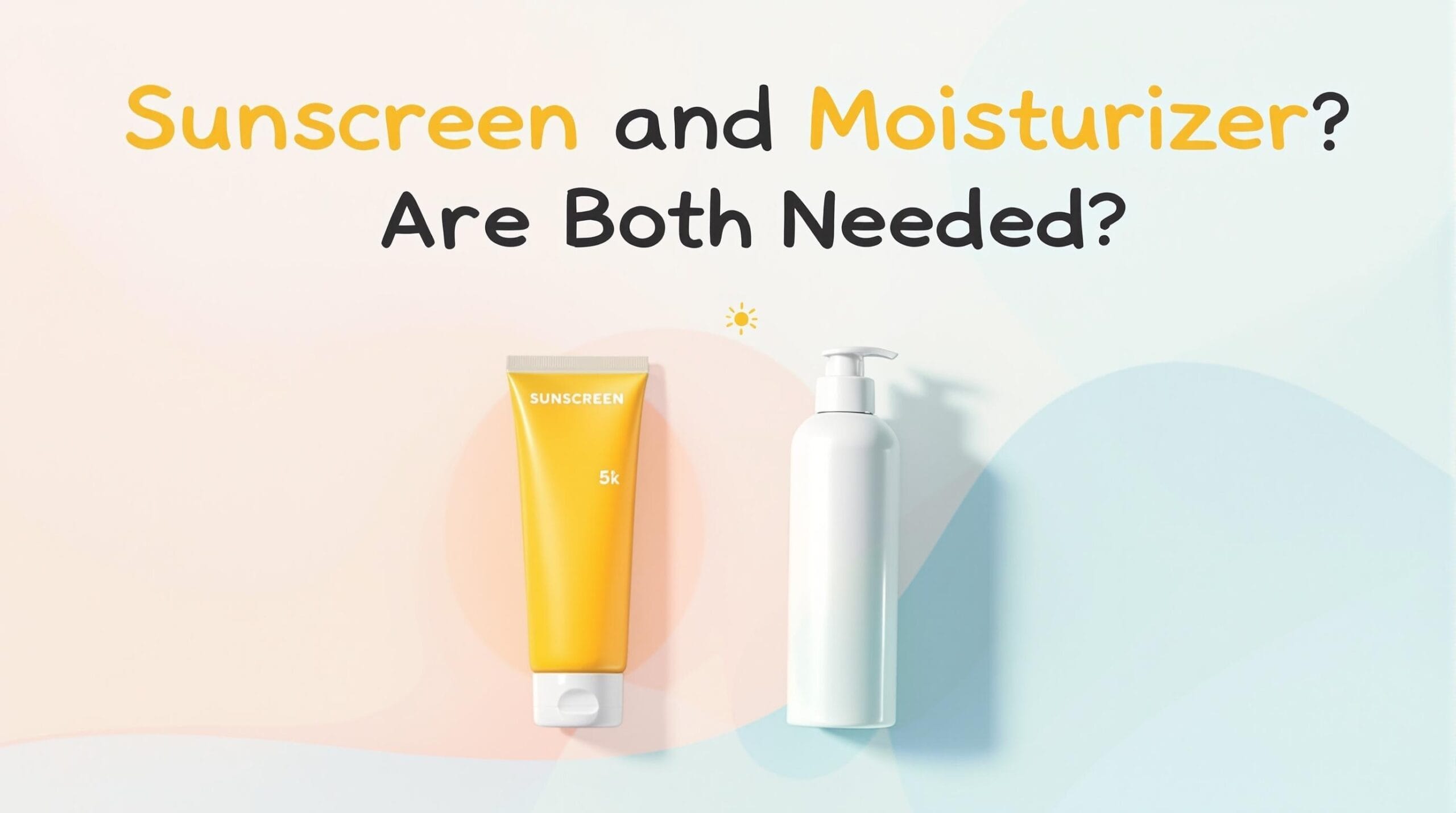
The skincare community often finds itself divided between the proponents of sunscreens and those who champion moisturizers. Sunscreens are designed to protect your skin from harmful UV rays, which can lead to premature aging and skin cancer.
On the other hand, moisturizers primarily aim to hydrate the skin and maintain its natural barrier. This debate stems from common misconceptions about their roles. While some view them as interchangeable, their purposes are distinct and should be considered carefully as part of your skincare routine.
Many people believe that as long as you apply sunscreen, you’re fully protected, neglecting the moisturizer. There’s a belief that sunscreen alone suffices because some formulations include hydrating ingredients. However, the effectiveness largely depends on your skin type and the specific product. To reap the full benefits of both, it’s crucial to understand how each works and their complementary nature in skincare.
Can You Skip the Moisturizer? Here’s the Scoop!
The question of whether you can apply sunscreen without a moisturizer doesn’t have a one-size-fits-all answer. Factors such as skin type, the environment, and the formulation of the sunscreen play significant roles. For instance, those with naturally oily skin might find sunscreens with hydrating ingredients adequate, while individuals with dry skin often need additional moisture. The climate also influences this choice. In humid conditions, a standalone sunscreen might suffice, whereas, in dry climates, a moisturizer is essential before applying sunscreen.
Sunscreens come in different formulations, with variations in ingredients that provide moisture. Some have oil-absorbing properties suitable for oily skin, while others are rich in emollients, benefiting drier skin types. The skin’s condition during different times of the year can also necessitate changes in one’s skincare routine. Understanding your skin’s unique needs and adapting accordingly ensures both protection from UV rays and adequate hydration.
For Oily Skin: Yes or No?
Individuals with oily skin often wonder if they can bypass moisturizer when using sunscreen. The simple answer is yes—but only if you’re using a sunscreen with moisturizing benefits. Opt for lightweight formulations that are non-comedogenic to prevent clogging pores. Sunscreens labeled as “mattifying” or “oil-free” can help maintain skin balance without adding extra shine.
Some sunscreens are formulated to double as lightweight hydrators, meeting the needs of oily skin types. These formulations typically include ingredients like glycerin or hyaluronic acid, which hydrate without a greasy feel. By selecting the right product, those with oily skin can streamline their routine and still keep their skin healthy and protected.
For Dry Skin: A Must or Just Optional?
Dry skin demands more from a skincare routine, and generally, skipping moisturizer isn’t advisable. Sunscreen with moisturizing elements can offer some relief, but often it’s insufficient for very dry skin. The combination of a dedicated moisturizer and a sunscreen ensures that the skin remains hydrated and protected from UV rays.
Hydration is critical for maintaining skin elasticity and preventing irritation. For dry skin types, applying a moisturizer before sunscreen locks in moisture. Look for sunscreens that have emollient ingredients such as shea butter or oils. By layering these products, you ensure comprehensive care and protection against dryness and sun damage.
Mixing the Perfect Formula: Sunscreen & Moisturizer
Combining sunscreen and moisturizer doesn’t have to be tricky. Understanding the layering technique is crucial for effective skincare. Start with the lightest product first; if you’re using a separate moisturizer and sunscreen, apply the moisturizer first. Allow it to absorb fully before layering on sunscreen. This ensures both products can perform their roles optimally without interference.
Commercially available products that blend both sunscreen and moisturizer are gaining popularity. These formulations offer convenience and are particularly beneficial for busy individuals. When choosing such dual-purpose products, ensure they meet your skin type’s needs and have an adequate SPF rating—at least SPF 30 for daily use.
Best Sunscreen Products That Double as Moisturizers
Here is a curated selection of sunscreens that also offer moisturizing benefits:
- La Roche-Posay Anthelios Melt-In Milk Sunscreen SPF 60: Known for its broad-spectrum protection and moisturizing properties, it’s suitable for dry skin.
- Cetaphil Daily Facial Moisturizer SPF 35: Lightweight and ideal for sensitive skin, providing adequate protection without causing breakouts.
- Neutrogena Hydro Boost Water Gel Lotion SPF 50: Contains hyaluronic acid for intense hydration, recommended for all skin types seeking a dewy finish.
How to Choose Wisely: Skin’s Best Defense!
Choosing the right skincare products involves considering your skin type and lifestyle. Start by looking at your skin’s specific needs—whether you require oil control, extra hydration, or a combination of both. Also, consider your lifestyle. If you spend a lot of time outdoors, a higher SPF and water-resistant formula might be necessary.
Understanding sunscreen labels is crucial. Look for terms like “broad-spectrum” to ensure protection against both UVA and UVB rays. Also, familiarize yourself with common ingredients that suit your skin type to avoid potential irritations.
The Importance of SPF: Know What You’re Getting!
SPF, or Sun Protection Factor, tells you how well a sunscreen can protect your skin from UVB rays. Many people misunderstand SPF levels; an SPF 30 blocks about 97% of UVB rays, while an SPF 50 blocks around 98%. The difference may seem minimal, but for those with sensitive skin or extensive sun exposure, it matters.
Always apply enough sunscreen—about a teaspoon for the face and a shot glass for the body. Reapply every two hours, especially if you’re swimming or sweating, to maintain optimal protection throughout your day.
Myths Busted: Common Misbeliefs About Sunscreen
Many misconceptions about sunscreens usage persist, leading to improper application and reduced effectiveness. One common myth is that sunscreen is only for sunny days. In reality, UV rays penetrate clouds, so applying sunscreen daily is critical. Another myth suggests sunscreens are only needed once a day; however, reapplication is vital for sustained protection.
It’s often believed that higher SPF levels offer twice the protection or that darker skin tones don’t need sunscreen. These are false assumptions. Understand that skin damage accumulates over time, regardless of skin color or SPF rating. Use sunscreen consistently to prevent long-term damage.
Sunscreen Alone is Enough: Truth or Myth?
The belief that sunscreen can fully replace a moisturizer is a myth. While some sunscreens have hydrating properties, they’re not designed to provide long-term moisture. Neglecting moisturizer can lead to dry skin, especially in arid climates, reducing skin resilience over time.
Final Thoughts: Your Skincare Routine Matters!
In conclusion, both sunscreen and moisturizer play critical roles in skincare. Whether or not you can combine them depends on personal preferences and skin needs. Understand your skin type, lifestyle, and the environment to make informed decisions. Creating a routine that integrates both products can ensure your skin stays healthy, hydrated, and protected from UV damage.
Actionable advice: Assess your current products, identify any gaps in hydration or sun protection, and adapt your routine as necessary. Prioritize using high-quality products that suit your skin type for the best results in your skincare regimen.
Frequently Asked Questions (FAQ) About Sunscreen
How often should I apply sunscreen?
Apply at least every two hours and after swimming or sweating for optimal protection.
Can sunscreen alone prevent wrinkles?
Sunscreen helps but doesn’t replace proper hydration; both are essential in combating premature aging.
What is the minimum SPF I should use daily?
An SPF of at least 30 is recommended for everyday use to protect against UV rays effectively.
Are natural sunscreens less effective?
Effectiveness varies by formulation. Look for broad-spectrum options to ensure comprehensive protection.
The Ultimate Guide to Choosing Sunscreen: Unlock the Secret to Flawless Skin! >>>
Discover the Ultimate Secrets to Selecting the Perfect Sunscreen for Indian Skin! >>>
Is Your Sweat Wiping Away Sunscreen? The Shocking Truth Revealed! >>>
Unlock the Secret: Can You Really Combine Moisturizer and Sunscreen for Ultimate Skin Care? >>>
The Shocking Truth About When to Apply Sunscreen: You’ll Never Guess! >>>
The Shocking Truth About Applying Sunscreen Directly on Your Face! >>>
Say Goodbye to Oily Skin After Sunscreen with This One Simple Trick! >>>
The Shocking Truth About How Long Sunscreen Really Lasts! >>>
Uncover the Shocking Truth About Broad Spectrum Sunscreen That Could Change Your Skin Forever! >>>
Revealed: The Shocking Truth About Applying Moisturizer After Sunscreen! >>>







